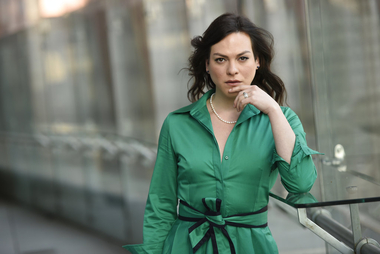Daniela Vega, trans actress, stars in 'A Fantastic Woman'

TORONTO (AP) — In one of the dreamy moments of surrealism that punctuate Sebastian Lelio's otherwise realistic "A Fantastic Woman," the film's transgender protagonist, Marina (Daniela Vega), walks down the street but an extreme, exaggerated headwind makes moving forward nearly impossible. She's tilted, as if climbing a mountain, as the gale-force winds try to beat her back.
To watch "A Fantastic Woman," Chile's Academy Awards submission, is to walk in the shoes of a trans woman, to feel the everyday indignities slung at Marina and be awed by her resolution in overcoming them.
Since its debut at the Berlin Film Festival, "A Fantastic Woman" has been celebrated as one of the year's best films and Vega's leading performance as a watershed event. While numerous high-profile stories ("The Danish Girl," ''Dallas Buyers Club," ''Transparent") have won plaudits for their portrayals of trans lives, the 28-year-old Vega is trans, herself. The strength and authenticity of her performance is a rebuke to the filmmakers who have argued that it's impractical to cast trans actors for trans parts.
"If we broaden our gaze, it will be more interesting, more beautiful," Vega said in an interview earlier this fall at the Toronto International Film Festival. "If we can make more diverse colors, people, stories, it will be interesting. Uniforms are for the military and the police, not for our thinking."
Sony Pictures Classics released "A Fantastic Woman" on Friday for a one-week awards-qualifying release. A larger release will come in February, but by then, Vega might already be making history. Some have speculated that Vega could be the first trans actor to be nominated for an Oscar.
"When I met her, I loved her. I was fascinated by her. I realized if I was going to make the film, I was never going to make it without a transgender actress," says Lelio, who is currently shooting an English-language remake of his "Gloria," with Julianne Moore. "It was an invitation for me to inhabit new cinematic territories."
In "A Fantastic Woman," the older male lover of Marina, a young cabaret singer, has a heart attack and dies. While consumed with grief, Marina is subjected to endless debasements and harassments by doctors, police and the family of the late Orlando (Francisco Reyes), who resent his choice of partner.
Lelio met Vega while doing research for the script. She was first a valuable consultant on the film and then its muse. When Lelio and Gonzalo Maza finished the first draft, Lelio sent it to Vega and asked if she would play Marina.
"It was the hardest thing I've ever done in my life," said Vega, speaking through an interpreter. "I had to leave Daniela and enter Marina by creating this contemplative, resilient character so different from myself. I'm much more explosive."
Marina's story isn't Vega's, but the character began absorbing Vega's identity and experiences. Vega had been singing and acting in theater and some small films for several years when she met Lelio. But for her, her artistic ambitions only came after her transition at 17.
"I wanted to be a woman, first. And then singer. And then actress," Vega said. "For me, to me it's not as important what you do so much as who you are."
Acting became, she says, a kind of therapy. During a dark period, a friend suggested Vega join an acting class.
"After I transitioned, I became very depressed. I put all my energy into the process of going from a child to a woman and after that I felt very empty," said Vega. "It was a year to a year and a half before I left my apartment. With the darkness, I made art."
Lelio grants that such a demanding leading role for a little-experienced actress was a major challenge for Vega, "and a huge gamble for me." But from their first meeting he found Vega — intense, poised — "a force of nature."
"She was in a certain way pushing things forward. I was trying to catch up to her complexity," says Lelio. "In the writing process, I came across the idea of making a trans-genre film about a transgender woman. It was a like a door that opened and offered a lot of freedom in terms of narrative opportunities and style."
"It's always oscillating between different genres," he adds. "It's a romantic film that becomes a thriller that becomes a portrait of a woman. It's a social film but then it's a musical and then it's a ghost story."
The rapturous response to the film and to Vega has caught each by surprise. But perhaps it shouldn't. They together created a classic and indelible big-screen heroine.
"I admire her. I think she's very different from me. I think that she's, internally, much more elegant than I am," says Vega. "I constructed her with the dignity that I see in women of my family, friends I know, people who have accompanied me in my life. In doing so, I tried to get Marina closer to the reality of what it is to be a woman, not necessarily a trans woman. Marina is any woman."
By JAKE COYLE, AP Film Writer
Copyright AP, all rights reserved. The Gayly 11/17/2017 @ 3:15 p.m. CST





